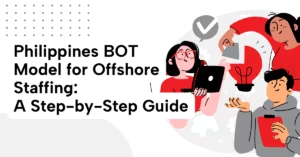The Philippines is emerging as a favored location for Global Capability Centers (GCCs), primarily due to its skilled workforce, competitive operational costs, and strategic geographic location. This has led to a growing number of multinational companies choosing to establish their operations within the global capability center Philippines sector, reinforcing the country’s position as a significant player in the industry. In this guide, we explore the increasing importance of GCCs in the Philippines and their essential contributions to the global business ecosystem.
Related post: GCC vs BPO: Why Building a Global Capability Center in the Philippines Offers More Value
What Is a Global Capability Center and Why It Matters?
A global capability center is far more than just an offshore office. It serves as a strategic hub that centralizes key business functions, driving efficiency, innovation, and growth. Unlike other models, GCCs act as seamless extensions of the parent company, aligning closely with its culture, values, and strategic objectives.
Over the years, GCCs have evolved from simple cost-saving initiatives to become vital strategic assets. Today, they provide specialized expertise and foster digital transformation, enabling organizations to stay competitive in an increasingly complex global market. So, how do GCCs differ from other global business models? Here’s a quick comparison:

This table shows how the GCC model uniquely combines strategic alignment, specialized capabilities, and operational excellence, setting it apart from other global business models.
Why Choose the Philippines for Your GCC?
Establishing a GCC in the Philippines offers a range of unique advantages that make it a standout choice for global operations, such as:
Access to Exceptional Talent
The Philippines produces a large number of graduates each year, ensuring a steady pipeline of skilled professionals for your GCC. These graduates are equipped with a strong educational foundation that emphasizes technical expertise, critical thinking, and literacy. Additionally, the country ranks among the top English-speaking nations worldwide, which eliminates language barriers and facilitates seamless communication with your global teams and customers.
Strategic Location and a Supportive Business Environment
Positioned in the heart of the Asia-Pacific region, the Philippines offers a prime location for global operations. By integrating your Philippines-based GCC with centers in other countries, you can implement a follow-the-sun model to maintain continuous operations. The nation’s business environment is also increasingly supportive of GCCs, thanks to government initiatives designed to attract foreign investment, including:
These measures have fostered a thriving ecosystem for global capability centers to flourish.
Cost Efficiency Without Compromising Quality
While price considerations are important when choosing a GCC location, the Philippines offers an ideal advantage—significant cost savings without sacrificing quality. With lower labor costs compared to Western markets and potential savings on operational expenses, the country presents an affordable option. What truly sets it apart is that these cost efficiencies come alongside delivering high-quality services, particularly in customer support, back-office operations, and IT support functions.

Technology and Innovation in Philippine GCCs
The technology landscape in the Philippines is quickly advancing, opening up fresh opportunities for GCCs to evolve and expand. As digital infrastructure strengthens, Philippines-based GCCs are increasingly focusing on key technology domains that drive both operational efficiency and innovation:
- Cloud Infrastructure – Establishing scalable, flexible IT environments that support agile operations.
- Data Analytics – Extracting actionable insights from large and complex datasets to inform better decision-making.
- Cybersecurity – Safeguarding sensitive data and ensuring regulatory compliance in an interconnected world.
- Artificial Intelligence (AI) and Machine Learning (ML) – Philippine GCCs use AI and ML to automate processes, enhance customer interactions, and improve predictive capabilities.
- Robotic Process Automation (RPA) – Adoption of RPA in Philippine GCCs streamlines repetitive tasks, increases productivity, and reduces errors, especially in finance, HR, and customer service operations.
- Blockchain Technology – GCCs leverage blockchain for transparent and secure transactions and efficient supply chains, reducing fraud risk and enhancing operational reliability.
Together, these technological advancements are reshaping GCCs in the country—transforming them from traditional cost centers into dynamic hubs of innovation and strategic value.
Overcome Challenges in Philippine GCC Operations
The Philippines presents compelling advantages for establishing GCCs, however, to fully unlock these benefits, your organization must be prepared to address potential challenges that can arise during operations.
Navigating Organizational Resistance
One of the initial barriers to a successful GCC launch is internal resistance from stakeholders in the home market. Concerns often center around potential job displacement and disruption to established processes. To address these concerns, a well-structured change management strategy is essential. Clear communication is critical, and your organization should emphasize that the GCC model is designed to augment existing operations, not replace them. Additionally, by showcasing how the GCC allows top teams to transition into more strategic, high-impact roles, you can foster leadership alignment and secure employee buy-in.
Addressing Infrastructure Limitations
While the Philippines is actively enhancing its infrastructure—particularly in internet reliability, transportation networks, and commercial facilities—some areas may still require tailored solutions to meet global operational standards. Many successful companies address this by selecting prime business hubs with solid infrastructure and adopting contingency plans such as redundant connectivity. Working with experienced local partners ensures smoother navigation through logistical nuances, helping your business maintain performance and service excellence as it scales in the region.
Staying Competitive in the Talent Market
As more multinational organizations establish GCCs in the Philippines, the competition for top talent, particularly in specialized domains, continues to intensify. To stay ahead, successful companies take a holistic approach that includes investing in strong employer branding, offering well-defined career progression pathways, and implementing robust growth initiatives. Many also leverage Employer of Record (EOR) services to simplify employee management, ensure compliance, and deliver a seamless experience for their workforce. Combined with strategic partnerships with universities and training institutions, these efforts strengthen the talent pipeline and position companies for long-term success.
Your Roadmap to GCC Expansion in the Philippines
Here’s a cohesive to guide your GCC journey in the Philippines:
1. Define Strategic Objectives
Begin by clearly articulating the purpose of your GCC. Determine whether your goals include cost optimization, innovation acceleration, or enhanced service delivery. Additionally, aligning the GCC’s objectives with your overarching business strategy ensures coherence and direction.
2. Identify Suitable Functions
Assess which business functions such as IT, finance, customer support, or marketing—are best suited for offshoring to the Philippines. Consider the country’s strengths in these areas and how they align with your organizational needs. This evaluation can further help you in effectively allocating resources and responsibilities.
3. Select the Optimal Location
Choose between established hubs with mature infrastructure or emerging cities with growth potential—while carefully evaluating key factors like talent availability, infrastructure quality, and cost-effectiveness. Selecting the right location is ultimately crucial to ensuring the long-term success of your GCC.
4. Determine the Operating Model
When establishing a GCC, it’s essential to choose the operating model that best aligns with your organization’s strategic goals and risk appetite. Options include building a wholly owned GCC, partnering with local firms or leveraging the Build-Operate-Transfer (BOT) model. The BOT model offers a phased and lower-risk pathway by allowing a local partner to initially build and manage the operations, with the intention of transferring ownership once the center is stable and fully integrated. This reduces upfront investment while also providing time to gain market familiarity and operational maturity. Each model varies in flexibility, and capital commitment—making it crucial to weigh these factors carefully in selecting the most suitable path forward.
5. Establish Strong Technology Infrastructure
Ensure your GCC is equipped with state-of-the-art technology infrastructure that supports seamless integration with global operations. Invest in secure IT systems, high-speed connectivity, and collaboration tools to facilitate efficient workflows. Consequently, a strong technological foundation is essential for operational efficiency and scalability.
6. Ensure Compliance and Risk Management
Stay abreast of local laws and regulations to ensure compliance in areas such as labor laws, data protection, and taxation. Develop risk management strategies to address potential operational challenges and ensure business continuity. Proactive compliance and risk management can safeguard your GCC’s reputation and operations.
7. Commit to Continuous Improvement
Adopt a mindset of continuous improvement by regularly reviewing processes, soliciting feedback, and staying updated on industry best practices. This approach can help your GCC adapt to evolving business needs and maintain a competitive edge. Lastly, continuous improvement fosters innovation and lasting success.
By meticulously planning each of these steps, you can establish a GCC in the Philippines that meets your strategic objectives.
The Future of GCCs in the Philippines in 2025 and Beyond
This 2025, the GCC sector in the Philippines is set to evolve significantly, with several fundamental trends expected to drive this transformation:
- Market Growth – The Philippines’ GCC market value is projected to reach USD 67.97 billion by 2032, which indicates a positive outlook for many businesses.
- Increased Automation – GCCs will increasingly adopt AI and automation to manage repetitive tasks, freeing up human talent to concentrate on strategic and high-value work.
- Focus on Innovation – Many GCCs will become testbeds for innovation, experimenting with new technologies, processes, and business models to drive enterprise-wide improvements.
- Shift to Higher-Value Outsourcing – The Philippines is transitioning from traditional call center services to higher-value outsourcing roles, including software development, data analysis, and engineering services. This evolution aims to leverage the country’s youthful and proficient workforce for more strategic functions.
- Hybrid Work Models – Flexible work arrangements—blending remote and in-office setups are becoming a standard, supporting both employee satisfaction and productivity.
Overall, by embracing change, investing in your people, and strengthening your foundational capabilities, you can position your company to lead the next wave of growth in the Philippine GCC space.

Drive Your GCC Goals Forward in the Philippines
The Philippines has firmly positioned itself as a top destination for GCCs, offering a compelling mix of skilled talent, cost efficiency, and strategic location. As the global capability center Philippines industry continues to evolve, these advantages are expected to grow even stronger in 2025 and in the coming years. Whether you are launching your first center or expanding your global footprint, the country offers a strong opportunity with supportive policies and a thriving ecosystem—making it ideal for building high-performing global operations.
Related post: Understanding the Build-Operate-Transfer (BOT) Model: A Strategic Approach to Outsourcing
Frequently Asked Questions (FAQs)
Q1: How many global capability centers are there in the Philippines?
With a growing number of GCCs, the Philippines is a top choice for strategic operations support. This growth reflects the country’s strong talent pool and competitive business environment in delivering high-quality services across various industries.
Q2: What does a global capability center do?
A GCC provides specialized support services such as IT, finance, customer service, HR, and analytics for its parent company abroad. This helps streamline processes, reduce costs, and improve efficiency through centralized offshore operations.
Q3: How do global capability centers differ from outsourcing?
While outsourcing typically involves contracting with a third-party vendor, global capability centers are owned and operated by the parent company. This allows for greater control, deeper integration with global operations, and stronger alignment with corporate strategy.
Q4: How does the Philippines’ workforce support the growth of Global Capability Centers in 2025?
The local workforce will be a key factor in the growth of GCCs in 2025, particularly within global capability centers in the Philippines. With its high level of English proficiency, strong educational foundation, and adaptability to various industries, the country produces a steady stream of skilled professionals. This skilled, hardworking talent pool makes the Philippines ideal for scaling global operations.
Q5: What is the difference between GBS and GCC?
In the GCC vs GBS comparison, the key difference lies in organizational structure and scope. Global Business Services (GBS) typically focus on end-to-end process delivery across multiple functions. On the other hand, GCCs may have a more specialized focus on specific functions or capabilities.
Q6: How much can companies save by establishing a GCC in the Philippines?
Setting up a GCC in the Philippines cuts costs through competitive labor, strong talent, and solid infrastructure. At the same time, businesses can maintain high-quality service and access to a skilled workforce.
Q7: How does the Philippines compare to other countries for GCC operations?
The Philippines GCC market stands out for its strong command of universal language, cultural compatibility, and cost efficiency. Compared to other countries, the country offers a blend of talent and service culture, making it ideal for companies seeking long-term growth.
Q8: Are there government incentives for companies setting up a global capability center in the Philippines?
Yes, the Philippine government offers various tax incentives, streamlined business registration, and infrastructure support to attract foreign investors establishing global capability centers.
Q9: How do Filipino cultural values influence global capability center Philippines performance?
Filipino professionals are known for their adaptability, hospitality, and customer-centric approach, which enhances the operational success of a global capability center Philippines-headquartered teams manage.
Growth starts with the right foundation. At One CoreDev IT (CORE), we help businesses establish Global Capability Centers in the Philippines, giving you access to Filipino experts and cost-effective solutions. Let’s build something great together—contact us today!





